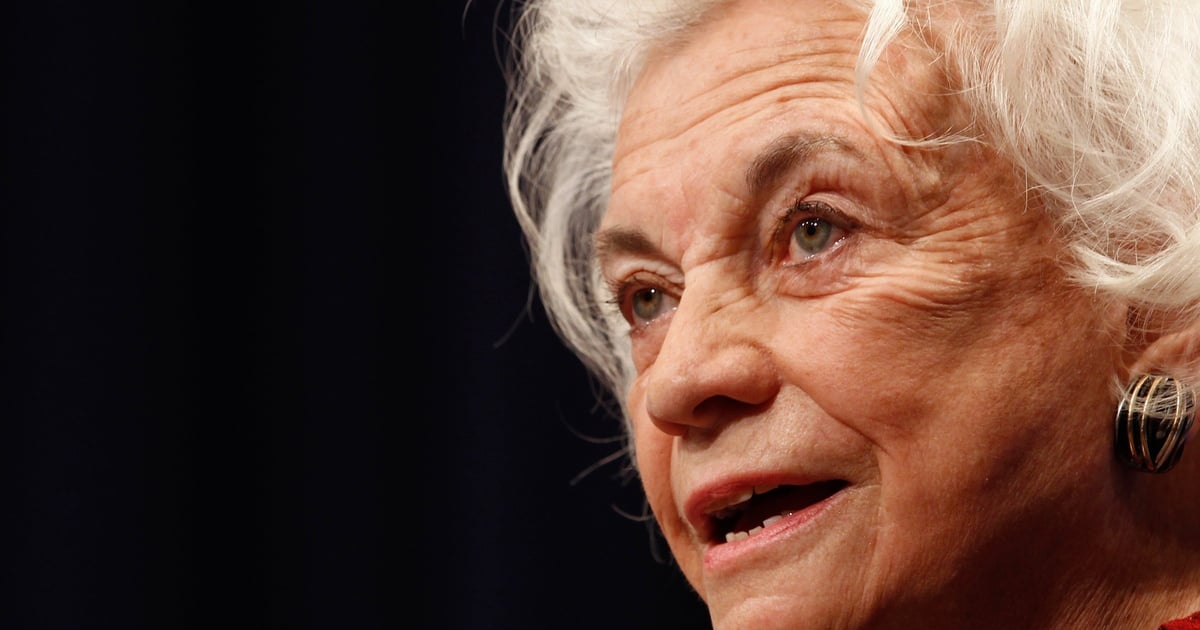Sign up for The Brief, The Texas Tribune’s daily newsletter that keeps readers up to speed on the most essential Texas news.
In 1996, graduates of Austin High School in El Paso were greeted with a pleasant surprise.
Their most famous classmate, Supreme Court Justice Sandra Day O’Connor, would be joining them for their 50th reunion.
“How wonderful it is to be back,” O’Connor told the El Paso Times. “I’m pleased to see I haven’t completely forgotten how it all looks. It’s fun to see the faces of people I knew here and find out what their lives have been like.”
O’Connor died on Friday at the age of 93, five years after she backed away from public life after being diagnosed with the early stages of dementia. The first female justice on the U.S. Supreme Court, she’s remembered by many as an Arizonan, because that’s where she spent most of her early career. But O’Connor was born in El Paso and attended high school there, making her a source of civic pride for Texans, too.
“Justice O’Connor was El Paso’s daughter — attending Radford School for Girls and Austin High School — and a trailblazer in this country,” City of El Paso Mayor Oscar Leeser said Friday. “We will always remember her, and now we will cherish her incredible legacy. May she rest in peace.”
During her time at Austin High School, O’Connor was known for her fiery spirit and natural leadership — earning knowledge that served her well as the first female Supreme Court justice.
“Oh, we always expected great things of her, She was an outstanding student,” high school friend and former classmate Gayle Welsch told the El Paso Times in 1996. “And now she’s still so down to earth and easy to talk to. We’re all so proud of her.”
O’Connor grew up on the Lazy B Ranch in southeast Arizona, a 200,000-acre ranch founded by her grandfather 30 years before Arizona statehood. It was there that she learned to drive a truck, mend a fence and fire a .22 rifle.
Born in El Paso on March 26, 1930, O’Connor spent most of her childhood splitting time between Texas and Arizona. At 16, she graduated sixth in her class from Austin High in 1946. Following graduation, she attended Stanford University and earned a degree in economics.
After earning her undergraduate degree, O’Connor attended Stanford Law School, where she met her future husband and finished among the top in her class, along with her future court colleague, William H. Rehnquist.
Following graduation, O’Connor returned to Arizona and became involved in Republican politics. She was appointed in 1969 to replace an Arizona state senator and won reelection for two terms. In 1972, O’Connor was elected senate majority leader, becoming the first woman to hold the position in any state.
Continuing her political rise in Arizona, O’Connor was elected to a state judgeship, and then appointed to the Arizona Court of Appeals. In 1981, she received a Supreme Court nomination from President Ronald Reagan. She was unanimously confirmed by the Senate on Sept. 21, 1981. O’Connor served as a Supreme Court justice for 25 years, often labeled as a moderate “swing vote” known to be reluctant to author broad sweeping rulings.
She was a vocal advocate for equal protection under the law. One of her more famous opinions was a concurring opinion in the landmark case Lawrence v. Texas, which struck down the state’s sodomy law in a major victory for gay rights. She wrote that the Texas law “brands all homosexuals as criminals.”
Texans have long touted her ties to the state. She was entered into the Texas Women’s Hall of Fame in 2008. The Fort Worth-based National Cowgirl Hall of Fame inducted her in 2002. There are multiple schools named after her in Texas, including the criminal justice magnet school housed in her alma mater, Austin High.
Gov. Greg Abbott released a statement Friday on the justice’s death, reflecting on the time he argued before Justice O’Connor in 2005 as Texas attorney general.
“As our country’s first woman on the Supreme Court, Justice O’Connor was a trailblazer and remained an inspiration to women throughout her lifetime,” Abbott said in the statement. “I have no doubt that her legacy will continue to live on for generations to come.”
State Rep. Eddie Morales, Jr., who represents El Paso, said he encourages others to join him in sending prayers to the O’Connor family.
“Today, I am remembering the trailblazing legacy of Justice Sandra Day O’Connor, the first woman to serve on the United States Supreme Court, who was born 93 years ago in El Paso, Texas,” Morales said in a statement. “Her legacy, commitment to the law and U.S. Constitution will long be remembered by generations.”





